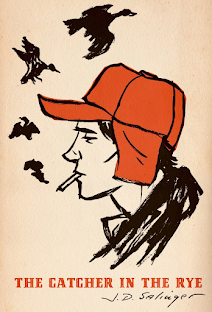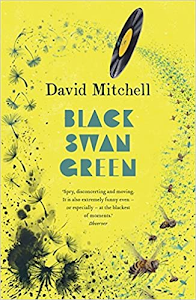A focus of our class discussions about the Catcher in the Rye has been Salinger’s unique style of including the reader in Holden Caulfield’s inner circle. I’ve read very few books that communicate with the reader so frequently, in a manner that makes the protagonist and reader distinct, like-minded people. Most books that make reference to “you,” the reader, are in second person narration; not portraying the protagonist and reader as acquaintances, but the same person, to make the story more emotionally fixating for the reader. Holden’s way of casually including the audience in his narration helps us to feel like his friends, like we are close to him in a way no other character in the book could be — except perhaps for Allie, Jane, and Phoebe. Given the way that Holden sees most people in the book as at least two-dimensional, if not entirely phony, his presumed intimacy with the reader makes us feel like we are special to him, and makes for a more engaging read. If the main character of a book is communicating with you, you’re going to listen to what they have to say.

Identifying the two distinct groups of Holden’s friends and
others also helps us to more clearly see his story through his worldview. If we feel like we are somehow exempt from Holden’s cynicism and judgement, we’re happy to join in on judging everyone outside the Caulfield protective bubble. This enforces Holden’s perspective more clearly in our minds; by convincing us to side with him through his narrative tactics, we see what he sees, dislike what he dislikes, and enjoy the little things he enjoys. His triumph is our triumph, and his sadness and pain is ours. We can sympathize with him in a unique way. We’re not just watching the story unfold, we’re following him along every step of the way; we’re by his side after Maurice steals his money, listening when he misses his brother, and consoling him after Stradlater beats him up.
As well as aligning with his worldview, the privilege of being in Holden’s group of friends has benefits in the depth of the story. We get to know about Allie, and Holden’s memories with him, which he certainly wouldn’t share with anybody that wasn’t important. We see Robert Ackley as annoying, but possibly misguided, Sally Hayes as a chance at happiness, and the Christmas show drummer as a masterful hero — little details that we can be sure wouldn’t matter to us if we weren’t part of Holden’s circle, and that we certainly wouldn’t be privy to. If Salinger had chosen to omit these parts of Holden’s narration, these side conversations with the reader, we wouldn’t feel as emotionally invested in the book. A personal connection with the protagonist gives us a deep understanding of what he’s going through, and makes it easier to identify with his struggles. I doubt that The Catcher in the Rye would have been as popular of a story if it wasn’t for the fact that Holden feels like our friend.


Well-written post! I think you're completely right about the idea that Holden's inclusion of the reader in his inner circle is crucial to making Catcher in the Rye such a sweetheart story. We as readers are able to understand the rationale behind much of Holden's decisions and outbursts, and many of his frustrations are valid points about society that we empathize with. If we were solely able to judge Holden on what he says and his actions (like the rest of the world), it may be a lot easier to dismiss the depth of his crisis and emotion and see him as just immature and irresponsible.
ReplyDeleteGreat post! I definitely agree that the narrative style allows us to learn Holden's thoughts and intentions more deeply. It helps the reader to understand why he might do seemingly foolish things, like not backing down Maurice or Stradtlater. If we were not able to learn what Holden was thinking about in those moments our opinions of him might be very different.
ReplyDeleteThis is a really good description of what makes Catcher in the Rye so unique of a book. I get the feeling that the intimacy between the reader and Holden that he is able to create using second-person has had a definite impact on many kids who are probably now adults. His cynicism and tendency to poke fun at others, act nonchalant, all while refusing to acknowledge his own flaws is a characteristic that was popularized by this book and has been carried on by kids who have read this book across the generations. Holden's close relationship with the reader is an often overlooked part of the book, but one that has definitely had influencial impact on the way generations of it's readers process the world.
ReplyDeleteI agree with how the second person narrative allows us to understand Holden more as a person. It might be interesting to consider if the book were formatted in a way in which we were too close to Holden's perspective - aka in a 1st person/3rd person omniscient narrative. It would have perhaps helped us understand Holden's POV thoroughly but we would also have lost the viewpoint from the outside in, seeing how other people in Holden's world (his friends/siblings) would view him. From the way Holden talks to us readers (ex. use of certain words like "that killed me") we can look at Holden with a more critical/objective view and attempt to think of real advice to him as a friend (instead of just 100% sympathizing with him).
ReplyDeleteHolden's use of second person is one of the most unique and remarkable things about this novel, and we do get the illusion that we are in that "inner circle" with Phoebe, Allie, and Jane. In fact, his use of second person is MOST personal and direct when he's talking about these people he cherishes--it's not "you would've puked" or "you should have seen him" but a more direct "God, I wish you could meet Allie" or "You'd like Phoebe." We aren't just a general "reader," as in Jane Austen ("Reader, I married him"). He seems to be talking to US individually, "knowing" that WE especially would get what is so cool about Phoebe. Jane is the only one he's shown Allie's glove to--apart from US, by telling us about it in descriptive detail when he writes the essay for Stradlater, who doesn't appreciate it at all. WE get it, though. That's what's important. We're not a moron like that guy.
ReplyDelete